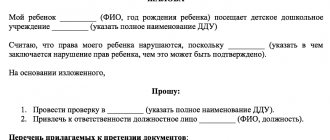The Russian Federation has had a registration regime since 1993, which states that every citizen must have a place of registration. Registration of a minor child takes a slightly different form than that of an adult. As practice shows, these differences to some extent simplify the procedure itself.
A child can live either with his parents or separately from them, not necessarily according to registration. If a minor does not live with his parents at his place of permanent registration, his parents must obtain a temporary one. Thus, questions arise about how to temporarily register a child, what nuances and laws need to be taken into account when carrying out this procedure, as well as what risks and nuances should be taken into account by owners of housing in which a minor is registered.
Governing laws and regulations
According to the legislation of the Russian Federation, the regulating laws and regulations regarding the procedure for temporary registration of a minor child are as follows:
- Article 20 of the Civil Code of the Russian Federation - establishes that the place of registration of a minor is established at the place of registration of his parents;
- Order No. 288 of the Federal Migration Service of the Russian Federation - spells out the rules for the temporary registration of a minor.
Does the rent change?
Yes, and to a greater extent. According to the Law of the Russian Federation No. 5242-1, art. 2, a person lives where he is registered, and where he lives, he must pay for that. Therefore, a fee will be charged for each tenant.
The tenant's responsibilities include caring for the common property and maintaining it in proper condition, as well as timely payment of accommodation.
That is why the owner needs to discuss this issue with the resident in advance.
What is temporary registration - registration - how to apply -Civil Lawyer
Documents for temporary registration of a child
Registration of temporary registration involves the collection and preparation of a package of documents that will need to be submitted to the registration authority.
It is worth noting that registration of a child in a preschool institution is possible only if there is and at the place of official registration.
In order to enroll a child in kindergarten, the parents will need to contact the Federal Migration Service, the passport office or the HOA in order to obtain permission. Parents will need to provide the following package of documents:
- an application in Form No. 1, which must be written either by the minor child himself, if he has reached 14 years of age, or by his parents.
- Passport of a citizen who represents the interests of a minor.
- Birth certificate or passport of the child.
The application is written according to the template established by law. You can familiarize yourself with it either at the government agency where you will submit the application, or you can order the form on the Internet or find a sample of it.
Type of registration at the place of stay without parents
Russian legislation provides for the temporary registration of young citizens without parents. The procedure for obtaining registration is not much different from the usual process, but draws attention to some features that may arise in various life situations.
- If the child is an orphan, then the registration application form can be filled out by citizens who are legal guardians of children, who need to provide to the appropriate department of the Federal Migration Service a document confirming the legality of the rights obtained for persons under the age of majority.
- In the case where the parents of children under 14 years of age are abroad and they live with their immediate relatives, obtaining temporary registration is problematic.
The law prohibits registering children under the specified age separately from the place of registration of their mother, father or official legal representatives. Even if you have photocopies of your parents’ passports, your grandparents can only count on the leniency of the FMS employees. - After the age of 14, obtaining temporary registration becomes available; a teenager can obtain it himself, having secured written consent received from relatives who have gone abroad, which they can send to his address.
Reference. Registration of temporary registration of children at a new address is the basis for automatic deregistration at the previous place of residence.
The legislation of the Russian Federation, taking into account the peculiarities and geographical location of the regions, provides for the preparation of documentation for obtaining registration via the Internet, which is a very convenient way to register citizens in sparsely populated areas.
Certificate production time
The procedure for temporary registration of a minor takes place within three days as usual. But it is worth considering that the time for reviewing documents can be extended to eight days if the registration chamber employees have questions or doubts regarding the reliability of the information submitted by the parents.
The deadline for preparing documents applies to all residential premises: private apartments, communal apartments, houses, rooms in communal apartments.
The review period begins from the moment the documents themselves are accepted by government agency employees.
The registration process itself can be tracked to understand at what stage it is taking place. To do this, the citizen will need to use the State Services portal and use the registration number to obtain current information about the application.
Timing and cost
A certificate of temporary registration is issued to a minor child within three working days, but sometimes the procedure is delayed for a week.
Asking if it is possible to somehow influence the timing and make registration faster - such a service does exist, but you need to pay for it separately. Otherwise, registration of registration, including temporary registration, is absolutely free for citizens of the Russian Federation. Foreign persons will have to pay a state fee of about three hundred and fifty rubles. The payment receipt is attached to the general list of documents.
Options for temporary registration of a minor child
Temporary registration of a minor child can be for different purposes or issued in different situations. The registration procedure will depend on the circumstances and reasons for which it is being done. Let's take a closer look at each of them.
Temporary registration of a minor child without the presence of parents
Temporary registration of a minor child can be carried out without the presence of his legal guardians or parents. To do this, it is worth understanding that the person himself must be 14 years old.
In this case, the law allows the residence and registration of a minor at a location other than the official residence address of his parents.
Temporary registration can only be completed by first obtaining the written consent of at least one parent.
It is worth understanding that agreement alone will not be enough. To carry out such an operation, it will be necessary to prepare a package of documents, which includes the following:
- consent of one of the parents;
- a document that is the basis for registration of a temporary one. For example, admission to an educational institution;
- title documents for real estate.
If a child has lost his guardians, he has every right to be registered at the place of registration of his adoptive parents or in his legal apartment.
Temporary registration of a minor child without the presence of parents requires the consent of representatives of the law, but if this is not possible, then you can go to court.
Temporary registration of a child for school
In order to send your child to school, you will need to provide a document that records his place of registration. If this stamp is missing, then any educational institution has every right to refuse to admit the child to school.
As a rule, a school for a minor is provided at the place of his registration, but there are cases when parents specifically make temporary registration in order to get a place in another educational institution.
From the point of view of the law, this action is illegal and if such a fact is revealed, the parents will be fined in the amount of 100 to 500 thousand rubles or imprisonment for up to 36 months.
Temporary registration for a newborn baby
In order to make a temporary registration for a newborn, you will need to prepare the following package of documents:
- certificate of place of registration;
- child's birth certificate;
- application in form No. 1;
- certificate of absence of registration of one of the parents, if such a situation exists.
As for the deadlines for submitting documents for the temporary registration of a newborn child, according to the law there are no deadlines, which means the procedure takes place as usual.
Without the owner's consent
If one of the parents has issued temporary registration, he has the right to legally register his child at his place of temporary registration without the consent and warning of the owner of the property.
The homeowner has no right to order or interfere with this procedure.
To mortgage housing
According to Russian legislation, the ownership of real estate, which is taken out as a mortgage loan, is transferred to the new owner at the time of signing the main agreement on the transfer of ownership and registering it with the relevant institutions.
The new owner has the right to dispose of his property in accordance with the laws of the Russian Federation and has the full right to own, use and dispose of it at his own discretion. Thus, a mortgage loan is not an obstacle to obtaining temporary registration for both a citizen and his child.
If the bank has specified in the main agreement the conditions that relate to registration in the purchased apartment, then this clause can be challenged in court and declared worthless.
Where can I register?
The law does not have any restrictions on the choice of place for registering at the place of stay, so it can be: rented housing, student dormitory, hotel or sanatorium, tourist centers, institutions providing medical or rehabilitation services, etc.
Having received official permission, a citizen has the right to reside in this territory until its validity expires. Upon expiration of the period and mutual agreement with the property owner, the registration is extended.
There are some special features when registering minor children.
Things to remember:
- children under 14 years of age are registered at the same address with their parents, or one of them; here you don’t even have to ask the consent of the property owner, this norm is spelled out in paragraph 2 of Art. 20 Civil Code of the Russian Federation;
- if children have already crossed the specified age threshold, then everything is much simpler here; they are allowed to register without parents, for example, with a grandmother, aunt, brother or sister.
If the child will be registered separately from the parents, the latter must confirm in writing their consent to register at a different address.
Consequences of failure to register
What are the consequences of not registering a minor child? What should parents expect?
Parents or legal representatives of a minor child must carry out the registration procedure at their place of residence. Registration documents must be submitted as early as possible. According to the law, the period for registration is 90 days.
If parents neglect this responsibility, they will face a fine of up to 7,000 rubles.
Does a newborn need a registration?
Parents must be aware that newborn children also need to be registered at their place of residence. If the family is located in another city or town, the child needs to obtain a temporary registration.
Otherwise, they will have problems with the dairy kitchen and medical care for the baby. There will also be difficulties in obtaining a maternity capital certificate.
IMPORTANT: temporary registration of a newborn is possible only in the living space where at least one of the parents is registered. There is no need to ask permission from landlords, owners or other persons related to this property.
Where to submit documents to obtain a certificate of temporary registration of a child
In order to carry out temporary registration of a minor, parents can contact the following institutions:
- The registry office is the place where the birth of a child is recorded and where you can obtain a certificate.
- Guardianship and trusteeship authorities provide all the necessary documents regarding the child’s case.
- FMS is an institution where the registration procedure can be carried out.
- Governments at the local level.
Submitting an application through State Services
One of the options for carrying out the temporary registration procedure is to register the child through the State Services portal.
Today, the use of an electronic system is a very popular and convenient option for carrying out various types of procedures and obtaining documents.
In order to use the portal, a citizen must register and obtain an electronic signature in order to be able to draw up documents.
In order to submit documents through the portal, a citizen will need to convert them into electronic form and upload them to the website.
On this portal you can also fill out an electronic application form to submit documents for temporary registration. It is very convenient that the system checks for errors automatically and gives you the opportunity to correct it in case of any inaccuracies or discrepancies.
After the system processes the request, the citizen will receive a notification inviting him to receive documents confirming registration with the territorial body of the FMS.
It is important to note that you will need to pick up the document within three days from the date of notification, because after the deadline, the application will be canceled and you will have to re-register.
How can you cheat?
Quite often, temporary registration of a child under 14 years of age becomes extremely necessary precisely in order for him to be accepted into the desired school, which is only accessible to children living in the same area where the institution is located.
At the same time, the family may live in a completely different place and not plan to move in real time. As a result, some citizens resort to a trick - they issue a fictitious registration. Since not everyone has relatives or very close friends who are ready to take on such responsibility, today there are many private traders who offer online help to everyone with registration of registration in the desired area. Of course, these are paid services, however, in practice, the risk of falling for scammers is very high. The amounts requested for services are significant, on average from ten thousand rubles, but in the end you can be left with nothing at all, and there is no demand from anyone, since initially it was you who wanted to cheat.
In addition, do not forget that schools check for fictitiousness even at the stage of submitting documents. Of course, some people bypass it if they have carefully thought out their trick, but the check is carried out more than once.
Rights and obligations of the registered and owner
Of course, from the moment a citizen receives his rights, he also has obligations to the owner of the apartment and directly to the state.
What responsibilities do a temporarily registered minor have:
- compliance with all rules and regulations;
- Payment of utility services;
- payment of rent;
As for rights, a citizen does not have the right to dispose of the property in which he is registered if he is not its legal owner.
Why can they refuse?
Russian legislation does not establish clear grounds for refusing temporary registration of children.
Therefore, a standard refusal can only be given if a parent wants to register a minor in someone else’s living space, although he himself is not registered there, or when the second parent does not give his consent (in this case, the issue often has to be resolved through the court). It will also not be possible to complete the procedure if you have not provided a complete list of documents or they are filled out incorrectly. However, in practice there are refusals due to housing not meeting sanitary standards (when the property is located in a heavily polluted area).
Responsibility for fictitious registration
Russian legislation provides for liability for any unlawful actions.
Citizens who have carried out fictitious registration will bear administrative responsibility for their actions. Russian legislation, namely Article 19.1 of the Code of Administrative Offences, provides for a fine in the amount of 200 to 500 thousand rubles or imprisonment for up to 36 months.
Dangers of registering foreigners
Any foreigner who comes to Russia for more than a week is required to register at the place of stay. Violation of this law entails serious administrative penalties ranging from fines to deportation from the country for up to five years.
According to the rules of the migration service, issues of registration at the place of stay are dealt with by the party receiving guests from abroad. Refugees, after receiving the status of forced migrants from the Federal Migration Service or the migration departments of the Ministry of Internal Affairs, register on a general basis.
Homeowners who register foreign citizens in their homes expose themselves to a certain risk.
In any conditions, they will remain the owners of the apartment, but several unpleasant moments may well happen:
- Firstly, in addition to the previously mentioned problems, such as increasing the rent, the inability to sell the apartment, and the registration of minors in the living space, the owner faces the risk of administrative liability for failure to provide information about registered foreigners to the migration authorities. Moreover, this applies to foreign citizens both from near and far abroad countries.
- Secondly, an administrative penalty will be imposed in the event of filing false information about the registration of foreigners, that is, if the registered foreign nationals do not actually live in the specified living space.
- Thirdly, having registered a citizen of another country in his living space, the home owner begins to bear civil liability to third parties, in particular neighbors, in the event of damage to their property.
Thus, registration, informing authorities, and monitoring of residence fall entirely on the shoulders of the owner, and he bears full administrative responsibility for the following points:
- providing information to the migration service authorities about the arrival of a foreign citizen;
- reporting to control authorities about the movements of a foreign citizen;
- control over compliance with the rules of residence;
- settlement of arising property conflicts with third parties.
For this reason, it is recommended that homeowners conclude a contract of civil liability insurance to third parties or take out insurance for the premises themselves. The cost of these expenses can be included in the rent.
Pitfalls when registering children
First of all, it is worth understanding that an apartment owner who registers an adult with a minor child has certain risks. What are they?
- There are cases when a parent takes advantage of the fact that the child has been given a period of temporary registration longer than he has, the citizen takes advantage of this and registers under the child.
- If, after the expiration of the temporary registration period, the parents go to court with the fact that they have nowhere to register the child for permanent registration, the judicial authority may extend the temporary registration.
- The risk of non-payment of utilities is inherent in this procedure. Very often there are dishonest tenants who do not fulfill their direct obligations.
- There is a risk that the child will be mistakenly registered not temporarily, but on a permanent basis.
In order to avoid such situations, the homeowner must approach the issue of registering temporary residents in his apartment very responsibly. It is worth understanding and not registering strangers. If any difficulties arise, a citizen must immediately file a lawsuit to resolve this issue.
Difficulties in eviction
Temporary registration is not the official place of residence of a person, it is just registration at the place of actual residence, which automatically terminates upon expiration of the period prescribed by the migration service. Therefore, the owner of the property should not have any difficulties with eviction.
If the period has expired, and persons registered on a non-permanent basis are not evicted, the owner has every right to resolve the issue by applying to the courts of general jurisdiction at the location of the disputed property. If the court finds that the period has indeed expired and the tenants are occupying the premises illegally, forced eviction will be applied to them.
Temporarily registered minors and incompetent persons are evicted on the same grounds.
Separate from parents
Is it possible to temporarily register a child without parents? temporarily register a child without parents only when he or she reaches 14 years of age . From this moment the citizen enters into the rights of limited legal capacity.
This means that he can, at his personal request, live in any place , but subject to obtaining the consent of one of the parents.
Are children registered temporarily with the consent of one of the parents, for example, only the mother? Some FMS employees make illegal demands to obtain the consent of both parents .
There is no such requirement in the Registration Rules, which means that a child can be registered temporarily in the presence and with the consent of one of the legal representatives.
For a temporary type of registration separately from their parents, the teenager must contact the FMS or MFC together with their parents and write an application. The mother or father accompanies the child and writes a statement of consent for his temporary registration.
A child can register separately from his parents only in the living space of a close relative . The relationship with this person will need to be documented. Registration with a stranger is only possible for a teenager over 16 years of age who has undergone the emancipation procedure.
Sale of housing with temporary registration
In practice, the owner of an apartment or private house has the right to sell such real estate along with the residents registered in it; this is not prohibited by law. The consent of the residents themselves, their opinion does not matter. On the other hand, buyers for such real estate are not found so quickly, since this is an encumbrance, even if in this case it is temporary. It is unlikely that there are a lot of people who want to live with strangers.
A way out of this situation will have to be sought with the help of experienced lawyers who specialize in resolving issues related to problematic housing. As a last resort, you can turn to agencies that buy them, but the cost of their services is often up to fifty percent of the transaction itself.
Rights of a registered child
In the case when we are talking about non-privatized housing, where all registered citizens, including children, become participants in the privatization and are entitled to a share of the property, temporary registration does not give anyone such a right. In the situation with private housing, it also does not in any way affect who owns and will own the property.
With temporary registration, a minor will receive the right to exclusively use living space, that is, the right to reside. If the parents of a minor are evicted, he himself is evicted.
However, it is extremely difficult to remove minors unless their parents or guardians are removed voluntarily. This is due to the fact that the rights of children are under special protection of the state and guardianship authorities. This means that it is impossible to evict a child anywhere, and before eviction you need to take care of a new place of residence. Very often, the owner has to evict the tenants through the court, which is always troublesome and the result is not always satisfactory - the eviction may be delayed.
How long to wait and how much to pay
If a person brings all the documents to the passport office or to the territorial division of the FMS, then registration takes no more than three days. If, for example, there is no certificate of ownership or use of residential real estate, then decision-making authorities will have to spend time verifying ownership. This usually takes another 3 days.
If parents already have registration, then formally their children should be registered free of charge. Problems arise when parents want to register their children at a different address. This is usually necessary in order to assign children to the right kindergarten or good school. In this case, the services of intermediaries and homeowners who consent to registration are paid.










